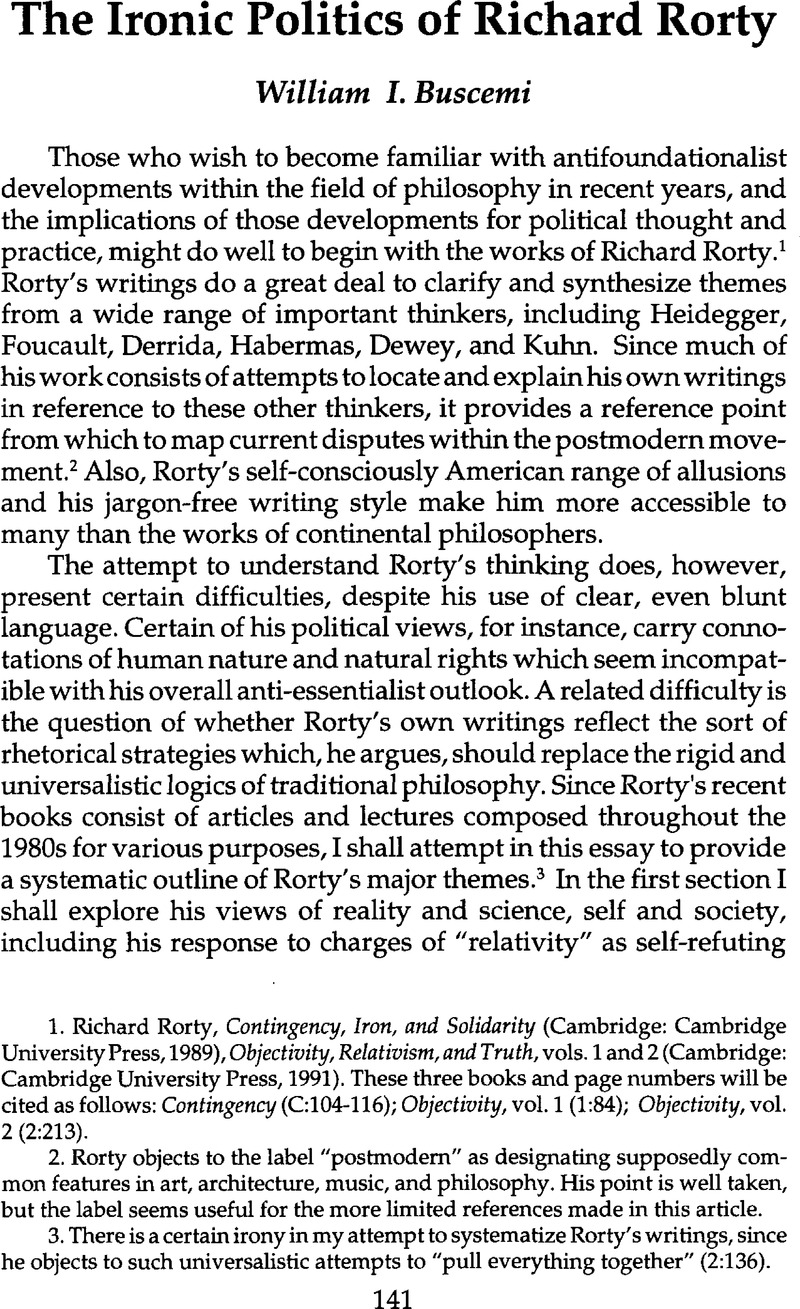Published online by Cambridge University Press: 05 August 2009

1. Rorty, Richard, Contingency, Iron, and Solidarity (Cambridge: Cambridge University Press, 1989)CrossRefGoogle Scholar, Objectivity, Relativism, and Truth, vols. 1 and 2 (Cambridge: Cambridge University Press, 1991).Google Scholar These three books and page numbers will be cited as follows: Contingency (C:104–116); Objectivity, vol. 1 (1:84); Objectivity, vol. 2 (2:213).
2. Rorty objects to the label “postmodern” as designating supposedly common features in art, architecture, music, and philosophy. His point is well taken, but the label seems useful for the more limited references made in this article.
3. There is a certain irony in my attempt to systematize Rorty's writings, since he objects to such universalistic attempts to ”pull everything together” (2:136).
4. I found especially helpful the article on Dewey by Bernstein, Richard J. in The Encyclopedia of Philosophy, ed. Edwards, Paul (New York: Macmillan Publishing Co., 1967).Google Scholar See also Dewey's, Logic, the Theory of Inquiry (New York: H. Holt & Co., 1938).Google Scholar
5. Rorty, , “Hermeneutics, General Studies, and Teaching,” Synergos; Selected Papers from the Synergos Conference 2 (Fall 1982).Google Scholar
6. Rorty seems to balk at carrying his nonfoundationalist views to their conclusion when he refers to pain as “non-linguistic,” common to all, and thus universal (C:94) He might have argued, more consistently with his overall position, that not even pain counts as undeniable fact, but only as perceived and weighted; to the masochist, pain is pleasure, and to the stoic it is unimportant. Even survival is seen differently by those who believe in an after-life, and by those biological species which opt for strategies of massive reproduction to allow for massive casualties.
7. Gottlieb, Anthony, book review of Rorty's Objectivity, Relativism, and Truth, in the New York Times book review section, 2 06 1991, p. 30.Google Scholar
8. For a helpful explication of Heidegger's “dasein,” see Dreyfuss, Hubert L., Being-in-the-World: A Commentary on Heidegger's Being and Time (Cambridge: Cambridge University Press, 1991).Google Scholar
9. Ibid., p. 119.
10. Bernstein, Richard J., “One Step Forward, Two Steps Backward; Richard Rorty on Liberal Democracy and Philosophy,” Political Theory 15 (1987): 554 and 560 footnote.CrossRefGoogle Scholar
11. Rorty, , “Thugs and Theorists: A Reply to Bernstein,” Political Theory 15 (1987): 569.CrossRefGoogle Scholar See also (C:196).
12. Rorty, , “Hermeneutics,” p. 6.Google Scholar See also (C:52).
13. Rorty, , “The Opening of American Minds,” Harpers, July 1989, pp. 18–22.Google Scholar
14. Rorty, , “Hermeneutics,” p. 5.Google Scholar
15. This, of course, is the project of analytic philosophy, which Rorty criticizes (2:12–14).
16. To be fair, Rorty does say that this proposal is not asserted as a universal truth, but as local as “the hopes of the North American bourgeoisie” (2:198) and as experimental as the American Constitution (1:196). Such “locals” as these, however, are so embracing and relatively permanent as to function, for the group interests at stake in the issues at hand, as universals.
17. This point is made by Mccarthy, Thomas, “Private Irony and Public Decency: Rorty's New Pragmatism,” Critical Inquiry, Winter 1991Google Scholar, and by Flathman, Richard in a book review of Rorty's Contingency, Irony, and Solidarity in Political Theory 18 (1990): 311.Google Scholar
18. Indeed, Rorty speaks of the “Rabelaisian carnival” that would be tolerated (encouraged?) in his polity (2:74,75).
19. Philosophy, Rorty says, is like literature and science, in that all of these tell stories (2:78, 79).
20. He gives indications of this intention when he says that his own “celebration of differences” is not relevant to “current” political tasks, and when he says that we can “defer” questions of philosophy, i.e., of virtue, until pressing “empirical” problems have been addressed. See “Thugs and Theorists,” pp. 572,573.
21. Rorty's “The Opening of American Minds” provides a revealing example of how his strategy might work, In matters of educational reform, he suggests that liberals and conservatives put aside their differences regarding such “abstract philosophical topics” as truth and human nature, and focus instead on the “concretely political” problems at hand. When this is done, a “compromise” can be reached, as follows: elementary and secondary schools can teach traditional American values, while colleges would teach “the failure of the country to live up to its ideals”. It turns out, however, that the traditions which Rorty would have taught in K-12 are themselves progressive, e.g., the abolition of slavery, the fight for womens' suffrage, and the restraint of the “robber barons.”
22. See, e.g., Mccarthy, , “Private Irony and Public Decency,” pp. 361 and 370.Google Scholar
23. Rorty, engages his deconstructionist critics in “Intellectuals in Politics,” Dissent, Fall 1991, pp. 483–90.Google Scholar
24. On Heidegger, see (1:187); on deconstructionists, see “Intellectuals in Politics,” p. 490; on Habermas, see “Thugs and Theorists,” p. 569.
25. “Intellectuals in Politics,” pp. 483–86.
26. Rorty quotes Dewey as saying that progress is “towards realization of the potentialities which have already been sketched out in the language we are now using—towards realization of our presently vaguely sensed ideals.” In “Hermeneutics,” p. 5.